Blank Label Comics is a collective of nine independent creators: Howard Tayler, David Willis, Paul Southworth, Kris Straub, Paul Taylor, Steve Troop, Brad Guigar, Dave Kellett and Greg Dean. Tayler, Willis, Troop, Taylor, Guigar, Kellett and Straub participated in our community interview.
1. Can you tell us a little about Blank Label Comics? What's the unifying theme, if any, of the collective? Motto or mascot? Can you tell us what each member contributes to BLC?
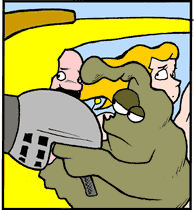 Howard Tayler: We never really thought of it this way. I'm more of a "motto" guy, and I think for Blank Label it would be something along the lines of "if we don't hang together we shall surely all hang separately."
Howard Tayler: We never really thought of it this way. I'm more of a "motto" guy, and I think for Blank Label it would be something along the lines of "if we don't hang together we shall surely all hang separately."
David Willis: Our unifying theme is "We are all awesome." You know the part of the movie where there's this giant explosion in the background and the heroes walk in slow motion away from it as the music swells? Well, we don't do that. That's too cliched. But we could totally pull it off if we wanted to.
(Paul Southworth contributes the explosions.) ((He has gastrointestinal problems.))
Steve Troop: We should have a motto. No mascot, though… Maybe we should all have ascots, though… that might be fun. I like Howard's motto.
Paul Taylor: Basically we all help each other out when we can, however we can. We haven't officially assigned each other job titles but we do our best to jump in with whatever we feel our strong points are.
Brad Guigar: Blank Label is — and always has been — an independent comics co-op. We each help one another succeed as an independent businessperson. We share some aspects of our businesses. We sell ads for our sites as a unit, for example, and act independently in other instances — such as book sales.
As far as a breakdown of contribution goes, aside from some broad strokes — Kris has written most of the scripts that run many of our sites, for example, and I handle much of the public/media relations tasks — everyone contributes to our ongoing discussion to the best of his own knowlege in each topic as it arises. Together, we have formed a formidable repository of know-how.
Dave Kellett: The unifying theme in my mind, is business. We're all cartoonists that respect one another's work and enjoy each other's humor, but the central and unifying idea behind it is 9 guys coming together to help one another succeed in their business as individuals. At times, this can mean pooling expenses, while at other times it is pooling expertise and advice. But the thing tying us all together is the goal to make our individual businesses succeedAs for the mascot…
I once drew up a mascot for BLC as a joke. He was called "Blankie", I think, but he was a joke even at conception.
2. A year has passed [since the founding of Blank Label Comics]. I'd like to hear about any lessons learned from the group in creating and promoting BLC. What worked well? What should have been done differently? – bobweiner
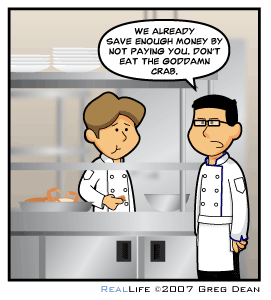 Tayler: There's a huge difference between "should have been done differently" and "COULD have been done differently." We have a lot of hard-won lessons, but since we don't get to go back and do things over, I'm going to have to say that I'm happy with our first year, missteps and all. Most of what we've learned is stuff along the lines of "Dave Kellet is better at working with book printers than anybody else we know," and had to be discovered through trial and error. If you're looking for advice on this front… well, all I can say is "be ready to learn from your mistakes, be flexible, and above all be forgiving."
Tayler: There's a huge difference between "should have been done differently" and "COULD have been done differently." We have a lot of hard-won lessons, but since we don't get to go back and do things over, I'm going to have to say that I'm happy with our first year, missteps and all. Most of what we've learned is stuff along the lines of "Dave Kellet is better at working with book printers than anybody else we know," and had to be discovered through trial and error. If you're looking for advice on this front… well, all I can say is "be ready to learn from your mistakes, be flexible, and above all be forgiving."
Willis: I dunno if I'd do anything differently! I mean, everything we did, fly or crash, was an important part of the process of learning to work as an incredible team. That learning experience is way more important than any hindsight.
Troop: It think it's worked remarkably well. Even though not everybody's ideas make it to full-blown project, none of us ever feels as though we're being ignored.
Guigar: We've been very careful to try to make sure everyone has plenty of opportunity to sound off before we make any decisions. It's a cumbersome process, but it pays off in the long run.
3. What's on tap for BLC and its members for 2007? How do you make this year a time of forward progress for all of you individually and for Blank Label Comics as well?
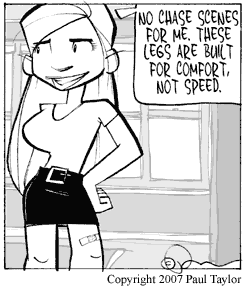 Tayler: Thematically, everything "on tap" for 2007 is centered around helping more of us go full-time. When we kicked this off I think it was only me, or maybe me and Willis. So far this year we've seen Dave Kellet and Paul Taylor make the leap, so there are now four of us cartooning for a living. Expect to see more of us making more money, then. That probably means more BLC stuff in print, as well as lots of other merchandise in the pipeline. You'll see more of us at conventions, too.
Tayler: Thematically, everything "on tap" for 2007 is centered around helping more of us go full-time. When we kicked this off I think it was only me, or maybe me and Willis. So far this year we've seen Dave Kellet and Paul Taylor make the leap, so there are now four of us cartooning for a living. Expect to see more of us making more money, then. That probably means more BLC stuff in print, as well as lots of other merchandise in the pipeline. You'll see more of us at conventions, too.
Willis: We're going to put books out there. We're going to make a big presence at conventions we attend. We're going to be rockstars.
Troop: I'm not sure what the others have in mind, but Melonpool will further evolve from webcomic to full-blown multimedia event. 2007 is very much a transition year for me. But 2008 looks very promising.
Taylor: We're all working on making a unified Con presence in the coming years and more self published books on the way.
Guigar: As of right now, four of our members have been able to grow their businesses to the point at which they've been able to concentrate on their comics full time: Howard Tayler, Davis Willis, Dave Kellett, and Paul Taylor.
Steve Troop has gone through an amazing transformation in his work and Melonpool will further evolve from webcomic to full-blown multimedia event.
That's the strength of BLC — it has helped each of these members to grow their business to the point that allowed them to do that.
Kellett: More and more of us are taking our cartooning work full-time, and I would hope that, by the end of 2007, we could add one or two more to that roster. Having just left Mattel, I can tell you that I have infinitely more time to work on Sheldon, Sheldon-related projects, and some other stuff that's coming down the pipe. And at the end of each work day, I'm 100% happier having worked in my studio that having commuted to my old job. Getting more BLC guys to experience that joy would just be awesome — and I think that's a goal we all share.
4. Gilead Pellaeon wrote a column this month with five suggestions for what webcomics collectives can do (Collective 'lective, What Makes You Effective?) – what do you think about his advice and what would you add or subtract to it? What advice would you give to other webcomic collecitves?
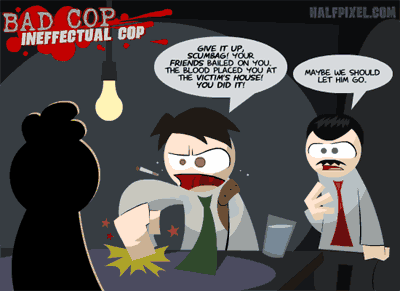 Tayler: Collective 'lective was a much better article than its title suggested (yes, I get the "Conjunction Junction" reference.) I agree with pretty much everything Gilead Pellaeon wrote, at least in principle.
Tayler: Collective 'lective was a much better article than its title suggested (yes, I get the "Conjunction Junction" reference.) I agree with pretty much everything Gilead Pellaeon wrote, at least in principle.
If you look at the five "joints" listed, you'll see that Blank Label does all of those to one degree or another. We have joint advertising and joint finances, but we also have individual advertising and finances. We have joint hosting available, but two of our members use other hosts, and this is working out just fine for us. We do joint convention attendance at the big events like Comic-Con International and Emerald City Comic Con, but we also attend conventions and events independently. The only place where we don't do much jointly is comics projects.
Ultimately, the model that we've adopted appears to be "if it's working well for one of us, maybe it's something ALL of us can use." That's where our hosting and advertising options came from. We incorporated because we saw how effective incorporation was for those few of us who were already individually incorporated, and that's where the joint finances came from. Oh, and the things each of us do when at conventions independently are tried out at our joint shows.
Willis: He left out the most important one! JOINT SENSE OF PURPOSE. The rest of those don't matter if everyone isn't on the same page about the seriousness (or not) of their craft. If some people are in this for fame and babes and mansions and others are just happy as they are, it's going to be tough to move the group anywhere. You have to have a shared motivation.
Troop: I rarely read blogs unless they feature the words "Steve," Troop," "Melonpool," "Star" or "Trek."
Taylor: I haven't read the article so I don't have a comment. As for learning experience to pass on to other possible collectives; keep your group small and work with people you know you'll get along with.
Guigar: I like Gillead. I'm sure I'd agree with almost everything he said. I have a wife, two kids, a daily comic, two weekly comics, and a full-time job. I don'tspend much time reading blogs. 🙂
Kellett: I don't agree with the column. You don't need shared comics projects, shared investments, nor do you need shared hosting.
With shared comics projects, the sum total is rarely greater than the component parts. If you have a joint Sheldon/Schlock/Real Life/Wapsi project you might think you'll have this great product that's going to be enjoyed by all of those disparate readerships. But more often than not, you end up with a disjointed project that appeals to none of those readerships, particularly, since it's 1/5 of what they actually go looking for.
And as for hosting, Blank Label shows you can host hither and dither, and still be effective.
As for joint money, I'm not sure this is significant, either. We do have shared accounts for certain inflow and outflow of cash, but it's a tiny percentage or our individual incomes. To have BLC bankroll a given cartoonist's projects just seems so foreign to me. Having Blank Label's money get involved with a print run wouls muddy the waters. We'd rather individually front the 5-10K for a book run on our own, and to run our own stores, than have the collective somehow assume that function. Or, if you have a book or concept you'd rather not risk the cash on, we've had a few members find success with Lulu runs. But in each case, it's been a case of the individual deciding how much they're willing to risk and for how much reward.
But I will agree that we've benefited from shared convention appearances/costs/preparations, and from shared advertising. And, on the most basic level, we benefit from the readership that is driven towards one another's titles.

5. Is BLC a democracy? How do collective decisions get made? Is it by consensus, or majority, or whoever types the loudest? 🙂
Tayler: Blank Label Comics is a member-managed LLC whose bylaws and charter are still in flux. For now, call it a "messy democracy." Or maybe a "meritocracy," since the ideas that have been proven to work for one or two of us are the things being considered for all of us.
Willis: I like Howard's "messy democracy" description. Compromises sometimes must be made, but they can be made because we're rough-and-tumble believers in ourselves and what we do.
Troop: Whatever ideas gets us the most excited. Creativity is action here at BLC.
Guigar: We try to achieve a consensus for most issues.
Kellett: For large-scale decisions, we tend to want unaninimity on a decision. But in most day-to-day decisions, a simple plurality usually carries the day.
6. How exclusive is BLC? Do members have to use certain services within the collective (i.e. hosting, advertising) or is it flexible with each individual? In terms of time you spend on your "webcomics" work, how do you balance time spent on yourself versus time spent on behalf of BLC? How is the workload to maintain the collective handled?
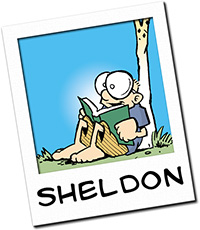 Tayler: How exclusive is it? Well… YOU can't join. But we don't have to use the same hosting. We do run shared advertising, but we also run ads individually. As to balancing individual workloads against the tasks required to keep the collective afloat, I think what saves us is communication. If something needs to be done, somebody gives a shout from the Danger Room in our Super Secret Volcano Base, and whoever is closest takes a look. Usually we can find somebody to take more than just a look, and actually KILL the invading giant robot. I mean, so far none of them have gotten past the outer perimeter.
Tayler: How exclusive is it? Well… YOU can't join. But we don't have to use the same hosting. We do run shared advertising, but we also run ads individually. As to balancing individual workloads against the tasks required to keep the collective afloat, I think what saves us is communication. If something needs to be done, somebody gives a shout from the Danger Room in our Super Secret Volcano Base, and whoever is closest takes a look. Usually we can find somebody to take more than just a look, and actually KILL the invading giant robot. I mean, so far none of them have gotten past the outer perimeter.
Willis: We're pretty exclusive! We want a very solid, close-knit feeling of shared purpose (see above), so a newcomer would have to fit seamlessly into our symbiotic machinery. That doesn't happen very often. It takes a certain recipe.
As for workload, I find most of what I put into BLC helps me as well, so I don't really classify the workloads differently. I've learned quite a few useful skills I can implement for myself in the future just from helping out my boys.
Troop: The individual cartoonist's work comes first, but all of us help out where we can. Combined, we have about 80 years worth of webcomic, comic, business, publishing and media experience that is invaluable to the others that are forging ahead in these areas for the first time. I think of BLC as more of a lodge or a think tank than anything else.
Taylor: It's so exclusive that each one of us has to slip the bouncer guarding the doorway a little something to get together for our meetings. I even had to tell him his shoes looked nice to get by. No, seriously.
Guigar: We all understand that each other is focused on his work first and BLC second. That being said, I think everyone's dedication to the group is pretty remarkable.
Kellett: BLC is exclusive in the sense that we're not looking to expand any time soon. And that mainly is due to your above question regarding decision-making: too many cooks in the kitchen can make for some long, drawn-out, and ultimately futile decisions. It's one of the big reasons a lot of us left Keenspot. Great ideas would be killed in a committee of 50 cartoonists.
No memeber has to sign up for or agree to certain services, with the exception of our 728×90 ads, and the acknowledgment that, if we ever come up with a new or cool inter-linking system, we'd all consider it. In general, we try to maintain as much flexibility as possible… because our goal is to help one another succeed, not introduce unecessary hurdles for success. I don't try to get in Howard's way, Howard doesn't try to get in Brad's way, and so on. Business and creativity both succeed when you remove administrative restrictions, so we try to do that. But when one of us asks for help, we all try to jump in and lend a hand.At the moment, certain key tasks have been delegated to or assumed by various members — but no one is permanently tasked with convention planning, bookkeeping, press, etc. They change around as needed.
7. With nine creative personalities working together on BLC, have you had any serious dust-ups between members? If so, what were they over and how were they resolved? What advice would you give others on managing the personality part of a webcomic collective?
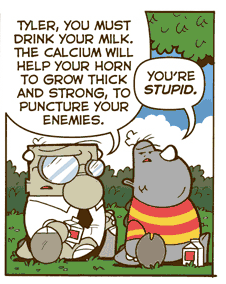 Tayler: Serious? No. Dust-ups? Yes. But when we keep in mind that we really are on the same team and in the same boat, those differences are typically resolved very quickly. What were they over? "Look and feel for convention presence" leaps to mind. Gee… artists arguing over something artistic? Who would have guessed THAT would happen.
Tayler: Serious? No. Dust-ups? Yes. But when we keep in mind that we really are on the same team and in the same boat, those differences are typically resolved very quickly. What were they over? "Look and feel for convention presence" leaps to mind. Gee… artists arguing over something artistic? Who would have guessed THAT would happen.
Willis: We've had some dust-ups, but, again, shared purpose! That's why that's so important. The smaller problems are just that — smaller problems.
Troop: The best advice I can give anyone is that YOU may not be as smart or as clever as you think you are. What I mean by that is if 6 out of 8 of your colleagues don't think that quitting your day job to focus on comics is a great idea right now, maybe it's not the time. Ultimately, it's your decision, but a collective is a great place to bounce ideas around — and bouncing ideas around often leads to truly inspired and even revolutionary ideas.
Taylor: The others will tell you that there have been little to no disagreements but actually we're all still in a tussle about whether Miller Lite tastes great or if it's less filling.
Guigar: Oh yeah. We've had arguments. I'm always impressed with our members' ability to debate furiously without carrying bad feelings on to other topics. I think we all know that we all want what's best for each other and the group.
We all chose each other to form BLC because we knew we were all pretty close together on how we wanted to grow our comics. We started off on the same foot. There's not too much we find ourselves at odds on.
Kellett: There have been strong disagreements, but no huge dust-ups, in my opinion. The fact that we try to keep BLC as minimal as possible helps keep the in-fighting to near absolute zero.
Straub: We haven't really had dust-ups or in-fighting, which is great and really probably peculiar for a group of nine human beings, let alone nine cartoonists. I think it's just a question of shared goals. Even if you've got people who dislike each other, if there's something you can join forces to achieve, that's going to have a galvanizing effect. In other words, I hate Howard Tayler, but there is cash at stake here. Howard, this was the best way I could think to tell you, by
orchestrating this phony interview. I'm sorry.
8. Congrats on the WCCA nominations, they are many and well-deserved! Following up from a recent brouhaha over at Digital Strips [Xerexes – this refers to a post on the WCCAs at that blog by gigglinsigler and the resulting comment thread], how much credence do you all put in your nominations? Do you feel like they should be reserved for those that really don't need the boost a nomination like this might provide? (Arguably this includes everyone on the BLC roster.) – gigglinsigler
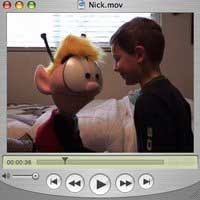 Tayler: Re: WCCAs… as a group, I think we're all happy to see that some of us got nominations, and even happier to see a win in there. Personally, I'm pleased as punch to have been beaten out by Phil Foglio for the Sci-Fi award. Which brings up the next question: should the WCCAs be reserved for comics that need a boost? Not if we want them to be taken seriously they shouldn't be. If cartoonists with low readership want to have a happy link-fest, that's fine, but our little industry is still in desperate need of real recognition, and the WCCAs are the best stab at that yet.
Tayler: Re: WCCAs… as a group, I think we're all happy to see that some of us got nominations, and even happier to see a win in there. Personally, I'm pleased as punch to have been beaten out by Phil Foglio for the Sci-Fi award. Which brings up the next question: should the WCCAs be reserved for comics that need a boost? Not if we want them to be taken seriously they shouldn't be. If cartoonists with low readership want to have a happy link-fest, that's fine, but our little industry is still in desperate need of real recognition, and the WCCAs are the best stab at that yet.
Willis: An award shouldn't be designed to be a boost. It should acknowledge greatness. That's what an award is FOR. Removing that absolves the award of any legitimacy.
Troop: I'm rather tired of the WCCAs. People should just create better comics rather than concerning themselves with some award. Of course, I'd change my tune if I ever actually WON one.
Taylor: I'm proud to be associated with these guys they're all super talented and their nominations and awards just stand to prove that. Do I feel that the WCCAs should be reserved for those that really need a boost a nomination might provide? Not at all, it would make the award ceremony nothing more than a plug to get noticed. At the same time, I do think that new faces need to be seen on the nominations list, but I'm not sure how to address that.
Guigar: Awards are fun. Like all fun things, it takes away from it to take it too seriously. As far as the idea that nominations should be awarded based on need rather than achievement, well… I'm not sure I understand it well enough to comment on it.
Kellett: If Coppola is the best director three years in a row, there's no way he shouldn't receive an Oscar in each of those years. And if Perry Bible Fellowship is the best webcomic three years in a row, the same should apply.
There's no reason to make the WCCA's like those little league trophies, where everyone gets one, to ensure no one gets their feelings hurt.
Or, to look at it from a different angle: If Sheldon sucks, I don't want to be nominated just because everyone that didn't suck has already been nominated in years past.
Straub: To me the WCCAs are important in that they represent what my peers are aware of, and what they want to honor. In that way I'm gratified for the nominations. But I think the awards still have some figuring out to do in terms of what they want to be, what they want to accomplish — it's great that one goal is to boost the lesser-known strips, but then I wonder if we all aren't in some deep phase of "lesser-known" when it comes to public awareness.
9. All of Blank Label [comics have a significant] amount of popularity and fan support despite lacking any real controversial content. For example, Real Life is little more than a blog comic (but a very well polished one) and Sheldon might be the most harmless comic on the Web. How do [you] feel about the stigma that webcomics should be edgier and provide something more than your simple, Sunday morning funnies strip might offer? What advice would you give to those trying to make it with common conventions like vulgar language, intense violence, and controversial content designed to rile up a target audience? – gigglinsigler
Tayler: Stigma? What stigma? There are certainly some people who think that just because webcomics CAN be proface, obscene, violent, and erotic that they SHOULD be. These people are wrong. Advice: if you think that vulgarity, obscenity, and their ilk are going to help you "make it" you need to look around. The people who get off on that stuff are not the people with disposable income to spend on your offensive slogan t-shirts. But then I'm biased — I'm family-friendly, and making a living at it.
Willis: Dude, the only thing you have to offer to set yourself apart from syndicated strips is to be FUNNY. Bad words and naked people aren't necessary. Sure, they can liven things up a bit, but you still have to use them intelligently.
Besides, I'd like to think I'm pretty damn controversial! I mean, all my characters wear a very ugly green. If that isn't thumbing my nose to the delicate sensitivities of the world, I dunno what is.
Troop: One thing a lot of the proponents of vulgarity and other "edgy" things in webcomics and other media seem to forget is that using these techniques is no substitution for good writing. I mean, if you take the cursing out of "Team America," it may not be AS funny… but it's still funny. Can the same be said for most webcomics in the same vein?
Taylor: Trying to stir up attention by having a comic intentionally vulgar or profane is going to work like any other shock element, once people get over the initial buzz, they'll see that there's no real value. People into that kind of thing are not the type to help you ever make it big.
Guigar: I think it's easy to write "shock" humor. Let's face it: Farts are funny. But I like the challenge of writing stuff that's funny without taking shortcuts.
That said, I don't have anything against anyone who draws an audience with vulgar language, violence, etc. They can do their thing, and I'll do mine. I'm confident that my approach is better for me in the long run.
Kellett: Do all webcomics need to be violent, controversial, and vulgar? There's definitely a place for that online, to balance out the treacly sweet newspaper world of the 1950's, but does that mean that every webcomic needs to appeal to 19-year old guys with anger issues? Man, if that's the case, let's go whole-hog and turn every magazine into Maxim and be done with it.
My advice is, write what has meaning to you. If it resonates with an audience, then great. And if not, then at least you created work that's meaningful to you — and will perhaps give you insight as to how make your next projects speak to a broader audience.
Straub: I may take a different tack than the others, where I think there is room for both projects from every creator, but maybe not under the Blank Label Comics banner. I kept Halfpixel.com off of BLC because I didn't want readers of Sheldon or Real Life to stumble across bad words if I felt like using them. But I mean, Shortpacked! is pretty edgy. It's not coarse adult, but it's two-chicks-are-kissing-on-a-pile-of-half-Transformed-Grimlocks adult. I wouldn't want my kids to see that either.
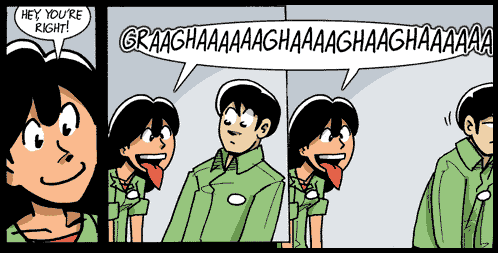
10. Last, I want to ask you all about your individual comics and projects. Could you leave us with previews of your plans for 2007 for your individual comics?
Tayler: Sandra and I are planning to put the first 1000 Schlock Mercenary strips into print in two hefty volumes, each almost three times the size of the first book. That's something like 480 pages of comics… daunting, at best. I'm not sure I'm willing to try to commit to ANYTHING past that. But let's go for it anyway: We are planning a website redesign including RSS feeds, I'm going to be in attendance at half a dozen conventions between now and October, I'll be doing a few new t-shirt designs, and we're going to be getting Schlock books carried by Amazon. That last should be happening any day now.
Willis: I'm going to continue to alienate myself from action figure collecting fandom by calling them all stupid. Way to play to my niche!
Troop: Probably 10-30 updates comics-wise in 2007. It could be less. It probably won't be more.
The BIGGEST news I have for Melonpool is that we're almost done filming our first stand-alone short film featuring Mayberry, Sam, Ralph, Sammy, Roberta and Jalea that will premiere one way or the other at the San Diego Comic-Con in July.
The biggest news I have for me behind the scenes is that I effectively quit my graphic design day job… and was hired as a puppet builder — due to the exposure of the Melonpool Quickcasts over at Quickstop Entertainment. It's pretty much what I always wanted from the comic — to get the attention of the print media from doing the webstrip. After 10 years, that never happened…. but within six months of doing the puppetry, I was contacted to start building and possibly designing puppets for a living.
Taylor: I'm looking to release the second Wapsi book by this summer and bring a LOT more of them with me to SDCC this time.
Guigar: Evil Inc will get more intense in 2007. Several storylines come together to a surprising climax for several main characters this year. Expect a new graphic novel based on the strip in late 2007.
The Evil Inc graphic novel is carried by Diamond Distributors and the Lightning Lady graphic novel is going to be offered in the March Previews. The second Evil Inc graphic novel should be offered later in the year, and my other, older books, after that.
Phables, my full-page comic about life in Philadelphia, has been promoted to a weekly schedule. Look for a Phables book by early 2008.
Courting Disaster, my weekly, single-panel comic about sex, love, and relationships, will continue. The website will expand over time to do more than deliver a weekly comic. A second Courting Disaster book is due in mid-2007.
I haven't ruled out one book with all of five years' worth the Greystone Inn strips in it, but that's a long way off — no sooner than 2008 at best.
Kellett: For 2007, there'll be two new Sheldon books in Summer and Fall, some t-shirts, the fleshing out of one and possibly two new strips that may (or may not) come to fruition, a dip of the toe back into oil painting, and finishing up two screenplays with my wife. Should be a good year.
Straub: 2007 is going to be a big year to me, as I'm starting a production house with Scott Kurtz and moving to Dallas. I'm really going to be diversifying and trying to do more than just barely scrape by with what I'm doing now. There are a lot of hours in the day, and once I get my time organized, I'm going to kick my comics production into overdrive. Look for a ton of new material at Halfpixel.com, keep two eyes on PvP: the Series, and hopefully there will be an all-new daily strip from mein the next couple months. I want to bow out like Alex Toth, at adrawing table doing what he loved, except I want to do it at 30.
Comments are closed.